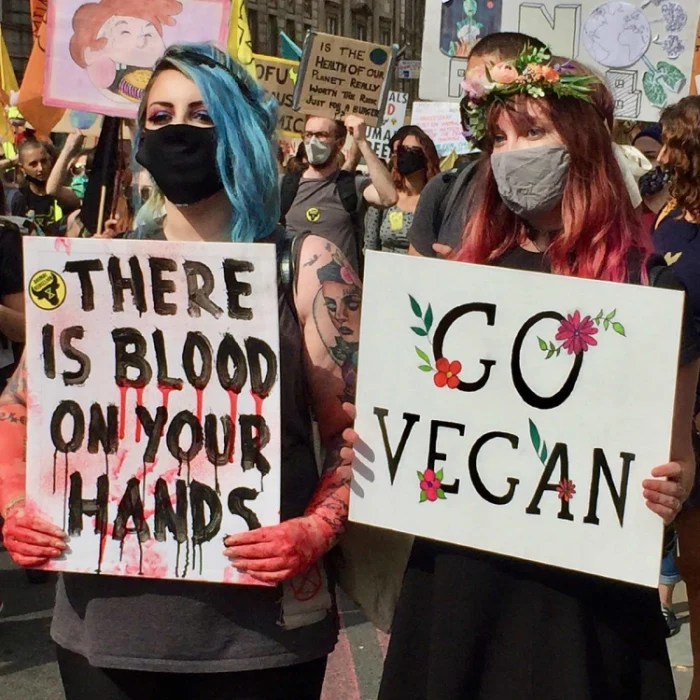Thinking about going vegan but bombarded with myths? “You won’t get enough protein,” “It’s too expensive,” or “You’ll miss out on good food.” Sound familiar?
Don’t worry—we’re breaking down the biggest misconceptions about veganism so you can make an informed choice.
Let’s separate fact from fiction and see what being vegan is really about.
Myth #1: Vegans Don’t Get Enough Protein

The protein myth never dies. People assume meat is the only reliable source, but that’s far from the truth.
Plenty of plant-based foods—like lentils, chickpeas, tofu, tempeh, and seitan—are packed with protein. Even athletes and bodybuilders thrive on a vegan diet.
The key? Eating a variety of protein-rich plants. Plus, most people get more protein than they actually need. As long as you’re eating balanced meals, your muscles will be just fine.
So, no, you don’t need steak to stay strong!
Read more: Top 13 Most Absurd Reasons Not To Go Vegan
Myth #2: Going Vegan Means Saying Goodbye to Delicious Food

Think vegan food is boring and flavorless? Not even close!
Plant-based dishes are bursting with bold flavors, rich spices, and endless variety.
From rich curries and cheesy vegan pizzas to creamy pasta and indulgent desserts, the options are endless. Even fast-food chains now offer plant-based burgers and nuggets.
With so many plant-based ingredients and seasonings, your meals can be just as delicious—if not better—than traditional dishes. Boring? Only if you’re not doing it right!
Myth #3: Veganism is Too Expensive

Many think veganism costs a fortune, but that’s a myth. While some specialty vegan products can be pricey, most plant-based staples—like beans, rice, lentils, oats, and vegetables—are some of the cheapest foods around.
Eating plant-based can actually save you money by cutting out expensive meat and dairy. Plus, with more vegan options in mainstream grocery stores, prices are more affordable than ever.
Want to eat vegan on a budget? Stick to whole, unprocessed foods, shop smart, and meal prep—it’s cheaper than you think!
Myth #4: Vegans Lack Nutrients

A well-planned vegan diet provides all essential nutrients. Iron? Leafy greens and lentils. Calcium? Tofu and fortified plant milk. B12? Supplements or fortified foods. Omega-3s? Flaxseeds and walnuts.
As long as you eat a balanced diet and stay informed, there’s no need to worry about deficiencies!
Myth #5: Veganism is Just a Trend

Veganism isn’t a passing fad—it’s a movement backed by ethics, health, and sustainability. More people are going plant-based as awareness grows about animal welfare, climate change, and long-term health benefits.
Major brands and fast-food chains now offer vegan options, proving it’s here to stay.
This lifestyle shift isn’t about trends—it’s about a better future for animals, the planet, and ourselves.
Myth #6: You Can’t Enjoy Your Favorite Foods

Think going vegan means saying goodbye to your favorite foods? Not anymore!
Thanks to food innovation, there are plant-based versions of nearly everything—burgers, cheese, ice cream, and even bacon.
Craving comfort food? There’s a vegan alternative for that. From creamy mac and cheese to degenerate desserts, you don’t have to miss out.
The best part? Many of these swaps are healthier and just as delicious. So, no sacrifices—just better choices!
Myth #7: Veganism is All or Nothing

You don’t have to be 100% vegan overnight. Every plant-based meal makes a difference—for your health, the planet, and animals. Some people go all in, while others ease into it.
There’s no “perfect” way to do it. Even small changes, like swapping dairy for plant milk or eating more veggies, matter. Progress over perfection—just do your best and enjoy the journey!
Myth #8: Anyone Can Give Vegan Advice

False information about veganism is everywhere. From social media influencers to documentaries and even well-meaning friends, myths spread fast.
But not all advice is backed by science.
Take the Netflix documentary What the Health, for example. It claims that eating an egg a day is as bad as smoking five cigarettes. Sounds shocking, right?
The problem is bold statements like this often lack scientific backing and can mislead people about what’s truly healthy.
The truth? A vegan diet can be incredibly beneficial—but only when done right. Research published in the Journal of the American College of Cardiology followed over 200,000 people for more than two decades.
It found that whole, plant-based foods like fruits, vegetables, nuts, and legumes significantly improved health. However, processed vegan foods—like fries, refined grains, and sugary drinks—were ranked just as unhealthy as some animal-based foods.
This proves that simply cutting out animal products isn’t enough; quality matters. A junk-food vegan diet won’t offer the same benefits as a whole-food, plant-based approach.
So, before taking advice from every “clean eating” influencer or viral vegan trend, check reliable sources. Look for studies, registered dietitians, and nutrition experts.
Not all plant foods are created the same, and being informed is the key to staying fit on a vegan diet.
Myth #9: Veganism is Bad for the Environment

Some claim veganism harms the environment, but research says otherwise. The Food and Agriculture Organization (FAO) reports that industrial animal farming contributes over 10% of global greenhouse gas emissions.
Meanwhile, a Stanford study suggests that widespread adoption of a vegan diet could cut food-related emissions by more than half in just 15 years.
Of course, not all plant-based choices are perfect. Almond and rice milk require large amounts of water to produce. However, better alternatives like oats and soy milk have a lower environmental impact.
A plant-based diet significantly reduces land use, water consumption, and pollution. While no diet is 100% eco-friendly, eating more plants and less animal products is one of the most fruitful ways to lower your carbon footprint.
The science is clear—veganism is better for the planet.
Read more: 10 Powerful Ways Veganism Helps Combat Climate Change
Myth #10: Veganism is Boring & No Fun
Veganism is anything but boring! It’s a chance to explore new flavors, experiment with creative recipes, and enjoy plant-based versions of your favorite foods.
From vibrant gatherings to mouthwatering meals, embracing a plant-based lifestyle is an exhilarating adventure filled with taste and discovery!
Conclusion
Don’t let myths keep you from exploring veganism. You won’t lack protein, miss out on delicious food, or break the bank.
With proper planning, you’ll get all the nutrients you need while making a positive impact on animals and the planet.
Veganism isn’t a trend or an all-or-nothing choice—it’s about progress. Whether you go fully plant-based or take small steps, every change matters.
So, stay informed, make choices that work for you, and enjoy the journey toward a healthier, more compassionate lifestyle!

